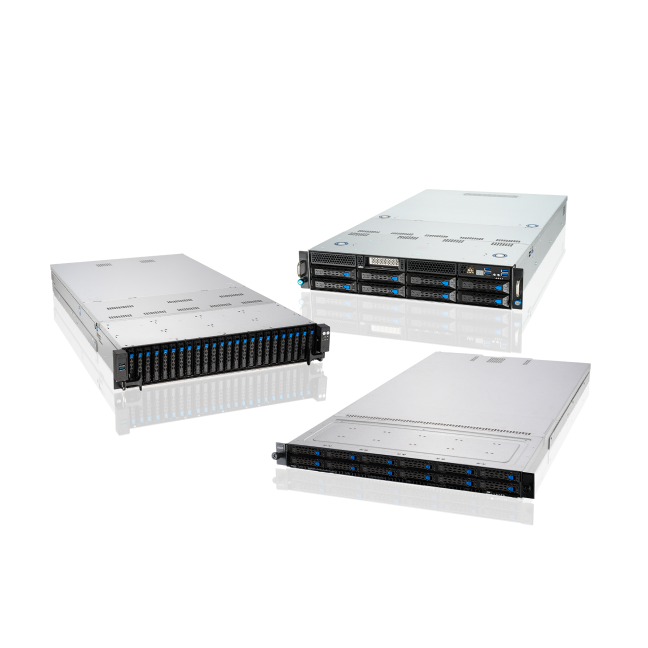ASUS Announces All-New AMD EPYC 7003 Series Servers to Drive Performance and Value for Modern Data Centers
TAIPEI, Tai┬Łwan, March 15, 2021 ŌĆö ASUS, the lea┬Łding IT com┬Łpa┬Łny in ser┬Łver sys┬Łtems, ser┬Łver mother┬Łboards and work┬Łsta┬Łtions, today announ┬Łced the intro┬Łduc┬Łtion of a com┬Łpre┬Łhen┬Łsi┬Łve ser┬Łver port┬Łfo┬Łlio based on the latest AMD EPYCŌäó 7003 series processors.
The all-new offe┬Łrings fea┬Łture both dual-socket and sin┬Łgle-socket ser┬Łvers in 4U, 2U and 1U chas┬Łsis with new archi┬Łtec┬Łtu┬Łre, chas┬Łsis and modu┬Łlar design to impro┬Łve sys┬Łtem fle┬Łxi┬Łbi┬Łli┬Łty and sca┬Łla┬Łbi┬Łli┬Łty. They also deli┬Łver sup┬Łport for the latest PCI Express┬« (PCIe┬«) 4.0, OCP 3.0 and BMC tech┬Łno┬Łlo┬Łgies to dri┬Łve lea┬Łding per┬Łfor┬Łmance and impro┬Łved TCO with bet┬Łter ser┬Łver performance.
- AMD EPYC 7003-based ser┬Łver portfolio
The new ASUS RS720A, RS700A, RS520A and RS500A-E11 series ser┬Łvers offer refres┬Łhed designs based on both dual-socket and sin┬Łgle-socket AMD EPYC 7003 series pro┬Łces┬Łsors. ASUS will also offer BIOS updates to enable ser┬Łvers based on pre┬Łvious-gene┬Łra┬Łti┬Łon EPYC 7002 pro┬Łces┬Łsors, inclu┬Łding ESC4000A-E10, RS620SA-E10-RS12 and RS500A-E10 series, to levera┬Łge all the fea┬Łtures of this new gene┬Łra┬Łti┬Łon, ensu┬Łring impro┬Łved and con┬Łsis┬Łtent per┬Łfor┬Łmance, as well as com┬Łpa┬Łti┬Łbi┬Łli┬Łty with the latest AMD platforms.
This new ran┬Łge will be bols┬Łte┬Łred by forth┬Łco┬Łming ASUS ESC series GPU ser┬Łvers in 4U chas┬Łsis to sup┬Łport up to eight NVIDIA GPUs or Xilinx FPGA acce┬Łle┬Łra┬Łtor cards in a sin┬Łgle sys┬Łtem, and opti┬Łmi┬Łzed for AI, deep lear┬Łning and HPC workloads. A com┬Łple┬Łte list of all ASUS ser┬Łver pro┬Łducts is available at:
https://www.asus.com/Commercial-Servers-Workstations
Enhan┬Łced ser┬Łver and infra┬Łstruc┬Łtu┬Łre secu┬Łri┬Łty will be imple┬Łmen┬Łted in the┬Łse new series by inte┬Łgra┬Łting PFR FPGA as the plat┬Łform Root-of-Trust solu┬Łti┬Łon for firm┬Łware resi┬Łli┬Łen┬Łcy, plus regu┬Łlar firm┬Łware thre┬Łat detec┬Łtion guard against and reco┬Łver from secu┬Łri┬Łty attacks.
The latest AMD EPYC 7003 series pro┬Łces┬Łsors aim to offer incre┬Łdi┬Łble per┬Łfor┬Łmance and con┬Łti┬Łnue to rai┬Łse the bar for the modern data cen┬Łters. Based on the Zen 3 core archi┬Łtec┬Łtu┬Łre, the latest AMD EPYC pro┬Łces┬Łsors help busi┬Łnesses deli┬Łver bet┬Łter time to results, expec┬Łted to pro┬Łvi┬Łde up to dou┬Łble-digit gene┬Łra┬Łtio┬Łnal per┬Łfor┬Łmance gains. EPYC 7003 series CPUs can help com┬Łpa┬Łnies maxi┬Łmi┬Łze the bene┬Łfit from their soft┬Łware invest┬Łment and pro┬Łvi┬Łde attrac┬Łti┬Łve ROI bene┬Łfits for data centers.
- Record-brea┬Łking per┬Łfor┬Łmance, veri┬Łfied by SPEC.org
Taking advan┬Łta┬Łge of the AMD EPYC 7003 pro┬Łces┬ŁsorsŌĆÖ com┬Łpu┬Łte lea┬Łder┬Łship per┬Łfor┬Łmance, the new ASUS RS720A-E11 ser┬Łver achie┬Łved the No. 1 result for per┬Łfor┬Łmance with dual AMD EPYC 7763 pro┬Łces┬Łsors ŌĆō secu┬Łring a top ran┬Łking across SPEC CPU2017 bench┬Łmarks, inclu┬Łding inte┬Łger rate, floa┬Łting-point rate, inte┬Łger speed and floa┬Łting-point for com┬Łpu┬Łte-inten┬Łsi┬Łve appli┬Łca┬Łti┬Łons. The results demons┬Łtra┬Łte that RS720A-E11 con┬Łti┬Łnues ASUS lea┬Łder┬Łship with the new AMD EPYC pro┬Łces┬Łsors, deli┬Łve┬Łring out┬Łstan┬Łding per┬Łfor┬Łmance for the ser┬Łver industry.
- ASUS CPU-balan┬Łced architecture
The new AMD EPYC 7003 series pro┬Łces┬Łsors excel at pro┬Łvi┬Łding full fea┬Łtures and func┬Łtion┬Ła┬Łli┬Łty for both dual-socket and sin┬Łgle-socket plat┬Łforms. The new ASUS ser┬Łvers intro┬Łdu┬Łce a CPU-balan┬Łced archi┬Łtec┬Łtu┬Łre to enable secu┬Łre and opti┬Łmal CPU-per┬Łfor┬Łmance effi┬Łci┬Łen┬Łcy. This archi┬Łtec┬Łtu┬Łre extends the full band┬Łwidth to eit┬Łher dual- or sin┬Łgle-CPU con┬Łfi┬Łgu┬Łra┬Łti┬Łons, enab┬Łling more com┬Łpu┬Łting capa┬Łbi┬Łli┬Łty and much-impro┬Łved over┬Łall power effi┬Łci┬Łen┬Łcy for com┬Łpu┬Łte-inten┬Łsi┬Łve workloads. This archi┬Łtec┬Łtu┬Łre allows cus┬Łto┬Łmers to take full advan┬Łta┬Łge of band┬Łwidth capa┬Łbi┬Łli┬Łties of the dual-CPU archi┬Łtec┬Łtu┬Łre with a sin┬Łgle CPU, while offe┬Łring the fle┬Łxi┬Łbi┬Łli┬Łty to upgrade later with the addi┬Łti┬Łon of a second CPU.
- Ver┬Łsa┬Łti┬Łle modu┬Łlar design
The latest ASUS ser┬Łvers intro┬Łdu┬Łce a new modu┬Łlar design to enable the easy sca┬Łle-up of con┬Łfi┬Łgu┬Łra┬Łti┬Łons to meet incre┬Łasing data-cen┬Łter workloads. For exam┬Łp┬Łle, the design of the onboard LAN modu┬Łle design allows the default rear-panel LAN port to be repla┬Łced with eit┬Łher up to four 1 Gb or two 10 Gb LAN ports, and one rear-panel PCIe 4.0 slot can be swit┬Łched for an OCP 3.0 modu┬Łle ŌĆō enab┬Łling data cen┬Łter-gra┬Łde trans┬Łfer speeds of up to 200 GB/s.
- Sca┬Łlable sto┬Łrage solutions
ASUS ser┬Łvers based on the new AMD EPYC 7003 series pro┬Łces┬Łsors fea┬Łture sca┬Łlable sto┬Łrage solu┬Łti┬Łons to sup┬Łport maxi┬Łmum per┬Łfor┬Łmance for data-cen┬Łter fle┬Łxi┬Łbi┬Łli┬Łty, and enable indus┬Łtry-stan┬Łdard SAS/SATA/NVMe inter┬Łfa┬Łcing through Broad┬Łcom Tri-Mode RAID adap┬Łters for increased con┬Łnec┬Łti┬Łvi┬Łty and secu┬Łri┬Łty. Fle┬Łxi┬Łble NVMe dri┬Łves on the front panel enable exten┬Łsi┬Łve sto┬Łrage and high-through┬Łput per┬Łfor┬Łmance, with more sto┬Łrage pla┬Łce┬Łments on midd┬Łle and rear panels available for fur┬Łther capa┬Łci┬Łty expansion.
- Remo┬Łte IT-infra┬Łstruc┬Łtu┬Łre management
With this gene┬Łra┬Łti┬Łon, ASUS is also intro┬Łdu┬Łcing the new ASUS ASMB10-iKVM ser┬Łver-manage┬Łment solu┬Łti┬Łon to sup┬Łport the latest AMD plat┬Łforms. Buil┬Łding upon the ASPEED 2600 chip┬Łset run┬Łning on the latest AMI Mega┬ŁRAC SPŌĆæX that deli┬Łvers fas┬Łter BMC boot time up to 39% com┬Łpared to the 2500 chip┬Łset and fea┬Łturing enhan┬Łced BMC net┬Łwor┬Łking per┬Łfor┬Łmance, all ASUS ser┬Łvers come with this solu┬Łti┬Łon and enable out-of-band ser┬Łver manage┬Łment through Web┬ŁGUI, Intel┬Łli┬Łgent Plat┬Łform Manage┬Łment Inter┬Łface (IPMI) and Red┬Łfi┬Łsh┬« API inter┬Łfaces. ASUS Con┬Łtrol Cen┬Łter (ACC) is an inte┬Łgra┬Łted IT soft┬Łware enab┬Łling remo┬Łte BIOS updates, moni┬Łto┬Łring of mul┬Łti┬Łple sys┬Łtems via mobi┬Łle devices, and one-click soft┬Łware updates and dis┬Łpatching, allo┬Łwing easier ser┬Łver manage┬Łment for any IT infrastructure.
- A sum┬Łma┬Łry of ASUS series servers
ASUS RS720A-E11 series ser┬Łvers are high-per┬Łfor┬Łmance dual-socket 2U ser┬Łvers sup┬Łport for up to 32 DIMMs, four dual-slot GPUs, 24 NVMe dri┬Łves, nine PCIe 4.0 slots and two M.2 all in one sys┬Łtem, and ide┬Łal for HPC, AI trai┬Łning and data analytics.
ASUS RS700A-E11 series ser┬Łvers are also high-per┬Łfor┬Łmance dual-socket ser┬Łvers, yet in a com┬Łpact 1U chas┬Łsis with up to 32 DIMMs, one dual-slot GPU, 12 NVMe dri┬Łves and three PCIe 4.0 slots. TheyŌĆÖre desi┬Łgned for HCI, cloud and vir┬Łtua┬Łliza┬Łti┬Łon environments.
ASUS RS520A-E11 series ser┬Łvers are main┬Łstream, 2U sin┬Łgle-socket sys┬Łtems with remar┬Łkab┬Łle per┬Łfor┬Łmance, inclu┬Łding two dual-socket GPUs sup┬Łports, 24 NVMe dri┬Łves and seven PCIe 4.0 slots. TheyŌĆÖre a gre┬Łat good choice for enter┬Łpri┬Łse and data centers.
Final┬Łly, for edge ser┬Łvers or SMB appli┬Łca┬Łti┬Łons, ASUS RS500A-E11 series ser┬Łvers fea┬Łture a sin┬Łgle-socket CPU with sup┬Łport for 16 DIMMs, 12 NVMe dri┬Łves and four PCIe slots.

